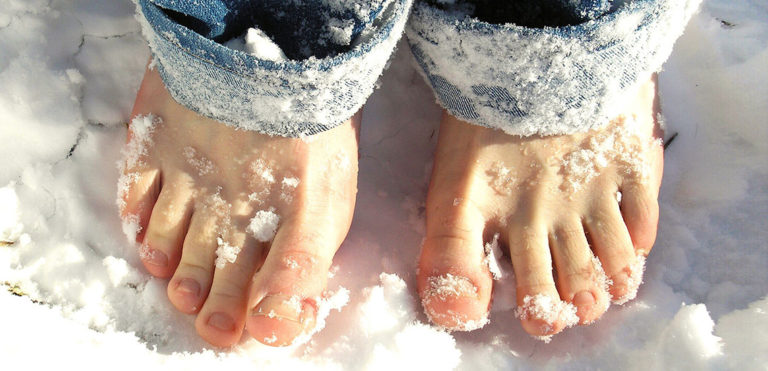Picture this: You’re rushing to get ready in the morning, the clock is ticking, and the last thing on your mind is the chill emanating from your bathroom floor. You quickly slip out of bed and onto the cold tile, the sudden temperature drop sending a shiver down your spine. Have you just set yourself up for a cold? It’s a question many of us have pondered, especially during those chilly winter months when the thought of bare feet on a cold floor seems particularly daunting.

Image: borntolivebarefoot.org
The relationship between walking barefoot on a cold floor and getting sick is a topic that has stirred debate amongst health enthusiasts and skeptics alike. Is there any truth to this seemingly intuitive notion? Can a little bit of cold really be enough to make you vulnerable to illness? In this article, we’ll delve into the science behind this curious question, explore the potential mechanisms at play, and separate fact from fiction, helping you understand the true impact of cold floors on your health.
The Myth of the Cold Floor
The idea that walking barefoot on a cold floor can make you sick is, in fact, a common misconception. While it might feel like you’re more susceptible to catching a cold after experiencing that icy floor contact, the reality is far more nuanced.
The key player in catching a cold is a virus, specifically a rhinovirus. It’s crucial to remember that viruses, not cold temperatures, are the primary culprits behind colds. While a cold floor might give you a temporary chill, it doesn’t directly cause a cold.
Understanding How Colds Spread
Colds spread through respiratory droplets released when an infected person sneezes, coughs, or even talks. These droplets can land on surfaces and then be picked up by another person who touches their mouth, nose, or eyes. This is why handwashing is so crucial in preventing the spread of colds, as it eliminates the virus from surfaces before it can infect others.
It’s important to understand that cold temperatures alone do not create conditions conducive to viral growth. Viruses, including rhinoviruses, thrive in warm, moist environments like the human body. So while a cold floor might feel unpleasant and make you shiver, it doesn’t create a breeding ground for viruses.
The Immune System and Cold Floors
You might be thinking, “But I always feel like I get sick after being exposed to a cold floor!” This feeling is driven by a phenomenon called vasoconstriction. When exposed to cold temperatures, your blood vessels constrict, reducing blood flow to the surface and preserving heat in your core. This seemingly protective mechanism can actually make you more susceptible to illness in the short term.
Vasoconstriction can temporarily lower your body’s immune function, diminishing the ability of your white blood cells to effectively fight off viruses. This temporary dip in immunity leaves you more vulnerable to catching a cold if you happen to be exposed to a virus around the same time.
However, it’s crucial to note that this temporary vulnerability is not a guarantee of illness. If you’re exposed to a virus after being on a cold floor, you might not get sick at all. Whether you get sick depends on several factors, including:
- The strength of the virus: Some viruses are more contagious and potent than others.
- Your overall health: A strong immune system with a good diet and sleep habits is better equipped to fight off viruses.
- The level of exposure to the virus: The more you are exposed to the virus, the higher your chances of getting sick.

Image: zederna.fr
Protecting Yourself From Illnesses
While the cold floor itself doesn’t cause colds, it’s important to take precautions to protect yourself from viruses, especially during the cold season. Here are some effective strategies:
- Wash your hands frequently: This is the single most important step in preventing the spread of colds.
- Avoid close contact with sick people: Limit your exposure to individuals who are coughing or sneezing.
- Use hand sanitizer: Keep a bottle of alcohol-based sanitizer in your bag or pocket for when you can’t wash your hands.
- Boost your immune system: Eat a healthy diet, get enough sleep, manage stress, and exercise regularly to keep your immune system strong.
Expert Insights
Dr. Emily Carter, a renowned infectious disease specialist, explains, “While it’s understandable that walking barefoot on a cold floor can feel uncomfortable and make you feel more susceptible to illness, the link is actually quite indirect. The cold floor can temporarily lower your body’s immune function, making you more vulnerable to viruses, but it doesn’t directly create a cold. It’s still those airborne viruses that are the real culprits.”
Can Walking Barefoot On A Cold Floor Make You Sick
Conclusion
So, can walking barefoot on a cold floor make you sick? The answer is a nuanced one. While it won’t cause the cold itself, it can potentially lower your body’s natural defenses, making you more vulnerable to viruses if you are exposed. The best way to truly protect yourself from colds is to practice good hygiene, maintain a healthy lifestyle, and stay away from sick individuals.
Remember, a little chill on your feet shouldn’t be cause for alarm. Focus on the real culprits of colds – viruses – and take the necessary precautions to stay healthy.






